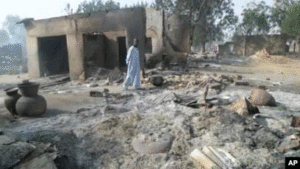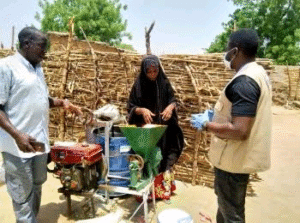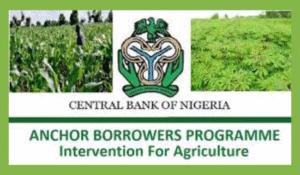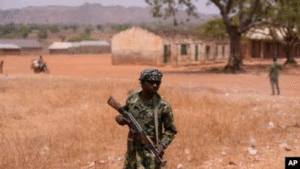As the rainy season begins in the northern states of Nigeria, farmers in the Northeast are facing a unique challenge: preparing their farmlands while contending with the ever-present threat of Boko Haram insurgents. In this special report, Hussaini Kafi in Kano takes a critical look at concerning resurgence of the dreaded terrorists sects and the impacts of the rains on first, the livelihoods of the farmers and second, the region’s economy.

In a region that is pivotal for the nation’s agricultural output, the convergence of insecurity, food scarcity, and weak government policies presents a dire scenario. This year, farmers in states like Borno, Yobe, Adamawa, and Taraba are bracing for yet another cycle of planting and harvesting under the shadow of violent extremism.
Despite the efforts of both regional and federal governments to mitigate the crisis, the situation remains fragile. In a region already grappling with poverty, unemployment, and poor infrastructure, insecurity has worsened the plight of farmers, pushing many to abandon their farmlands, further exacerbating food insecurity.
Insecurity and Its Impact on Farming Communities
Farmers in the Northeast have borne the brunt of years of insurgent violence. The destruction of crops, the kidnapping of farmers, and the looting of farm produce by terrorists have made agricultural activities increasingly risky. Farmers are often caught between wanting to feed their families and communities and the looming threat of attacks by Boko Haram militants.


A recent survey by the Nigerian Economic Summit Group (NESG) shows that over 60% of farmers in Borno and Yobe states reported abandoning their farmlands over the past two years due to fear of terrorist attacks. This situation has resulted in a significant reduction in agricultural output, directly contributing to the rise in food prices across the region.
Dr. Salisu Garba, an agricultural economist, underscores the economic consequences of insecurity: “The loss of farmlands means a loss of livelihood for thousands of families. This directly leads to food scarcity, which causes the sharp rise in prices that we are seeing today. Without a stable security environment, food production in the Northeast will continue to suffer.”
Government’s Response to the Insecurity
The response from the federal government, under the leadership of President Bola Ahmed Tinubu, has been multifaceted but remains a work in progress. While there have been notable efforts to bolster security, such as the establishment of new military and paramilitary units, experts argue that these measures have yet to translate into tangible relief for farmers.

Since President Tinubu assumed office, his administration has increased security operations, particularly in the Northeast. The military has conducted several airstrikes and ground assaults against Boko Haram and ISWAP factions, while security forces have been augmented with new personnel and equipment. The Nigerian Air Force expanded its fleet, and a 2,200-member Mines Marshal Corps was established to secure mining sites and combat illegal activities.

Critics of this development have queried the Tinubu-led administration’s slow responses to killings and dastardly attacks on farmers and other residents in the region. The critics raised a valid question about the northern region populating the security structures of the present administration. Observers say it is ironical to have the NSA, Mallam Nuhu Ribadu, Minister of Defence, Abubakar Badaru, Minister of State for Defence, Dr Bello Matawalle and the Chief of Defence Staff, General Christopher Musa, all from the North, yet the region remains in firm grips of terrorists.

However, despite these efforts, the violence continues, with insurgents reportedly targeting remote farming communities and displacing thousands. The North-East Governors’ Forum (NEGF) expressed concern over the ongoing insurgency, emphasizing the need for a multidimensional approach to addressing the crisis. In their communiqué, the governors called for enhanced collaboration with federal security agencies, better coordination, and a more robust counter-insurgency strategy. They also highlighted the importance of improving road networks and tackling the root causes of violence, such as poverty and unemployment
The Anchor Borrower’s Scheme and Its Limitations
In response to the agricultural challenges posed by insecurity, the federal government has continued its support programs for farmers, notably through the Anchor Borrowers’ Scheme. This initiative, designed to provide affordable loans to farmers for inputs such as seeds, fertilizers, and equipment, was initially hailed as a breakthrough. However, its effectiveness has been limited by the lack of access to farmlands due to insecurity.

Farmers in the region have reported that although they receive loans, they are often unable to access the inputs in time due to displacement caused by attacks or travel restrictions imposed by the insurgency. This has left many farmers unable to plant or harvest crops at the right times, thereby reducing the program’s impact on food security.
Dr. Aisha Bello, a security analyst, explains: “The Anchor Borrowers’ Scheme could be a game-changer, but the primary issue lies in the farmers’ inability to access their farmlands. The root cause of the failure of these initiatives is the lack of security. Until that is addressed, no amount of loan support will change the situation on the ground.”
The Rising Cost of Food and the Crisis in the Farmlands
The violence in the Northeast is not only pushing farmers away from their farmlands but is also causing food prices to soar. Basic foodstuffs such as maize, rice, and millet, which are staples in the region, have seen significant price hikes. The National Bureau of Statistics reports that food inflation in the Northeast has been among the highest in the country, with maize prices increasing by over 40% year-on-year.

For instance, in Yobe and Borno states, the price of a 50kg bag of maize, a major staple crop, has risen from N10,000 to over N16,000 in the past year, while the cost of a 25kg bag of rice has surged from N13,000 to N20,000. These price increases are attributed not only to the reduced availability of local produce but also to disruptions in supply chains caused by the insurgency.
Local markets, once bustling with produce from local farms, have become increasingly sparse, forcing consumers to rely on imported foodstuffs that are more expensive. This growing food insecurity is pushing more people into poverty, which in turn makes them more vulnerable to recruitment by insurgent groups.
The Northern States Governors’ Forum, in a joint meeting with the traditional rulers on May 10, 2025, acknowledged the impact of insecurity on the region’s economy and food security. They called for improved cooperation between states and traditional leaders to address the challenges, particularly in securing farmlands and ensuring safe food distribution channels. The forum also emphasized the urgent need to create an enabling environment for agricultural investment and infrastructure development to alleviate the economic burden on farmers.
Humanising the Crisis: Voices from the Farmlands
To understand the gravity of the situation, it is essential to hear directly from those affected. Fatima Garba, a 45-year-old farmer from Maiduguri, Borno State, shared her experience: “I used to farm maize and millet, but the last two years have been the hardest. We have been forced to leave our farms more than once due to attacks. Last season, I could not plant any crops because it was too dangerous to go to the farm. I am now relying on my husband’s small business to feed the family, but it’s not enough.”
Another farmer, Musa Umar, who once cultivated rice in Yobe State, explained, “We receive loans under the Anchor Borrowers’ Scheme, but there is no way to use the money if we can’t even go to our fields. The insecurity is getting worse, and it is getting harder to even get supplies from the market.”
These personal testimonies underscore the broader crisis faced by farmers in the Northeast, where insecurity, economic hardship, and agricultural neglect are making the road to recovery increasingly difficult.
The Way Forward: A Call for Action
As the rainy season begins and farmers in the Northeast face another year of uncertainty, there is a pressing need for comprehensive and sustained action. The government must prioritize security in rural areas, ensure farmers can safely access their lands, and provide timely support through programs like the Anchor Borrowers’ Scheme. Experts suggest that a long-term solution lies in improving the socio-economic conditions of these communities by creating sustainable livelihoods and tackling the root causes of insecurity.
The efforts of the federal and state governments, coupled with collaboration with local communities, will determine whether farmers in the Northeast can rebuild their livelihoods and contribute to the nation’s agricultural growth.



